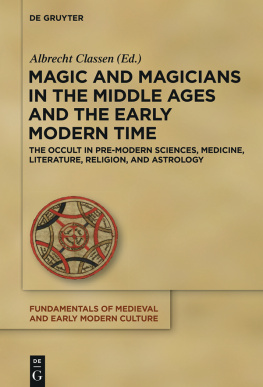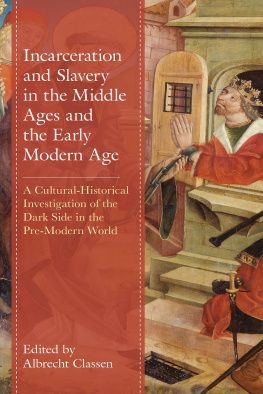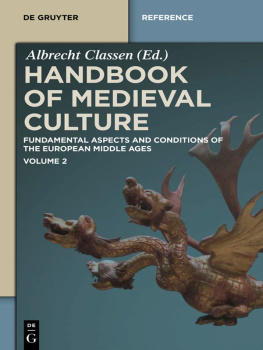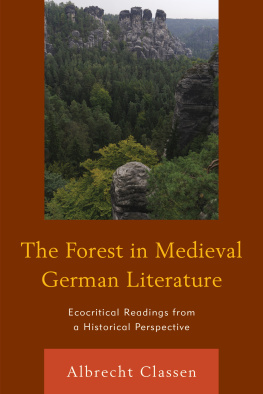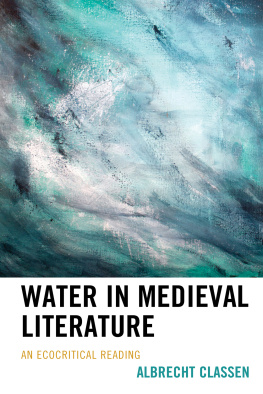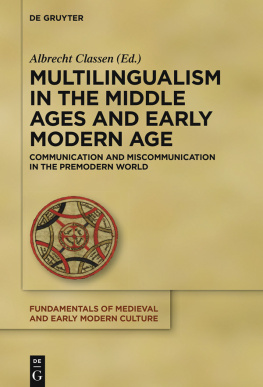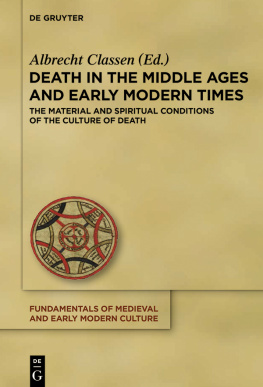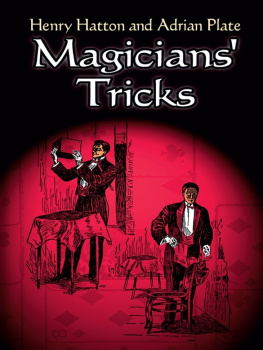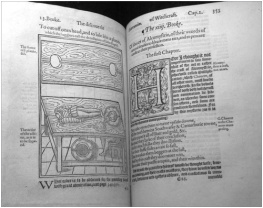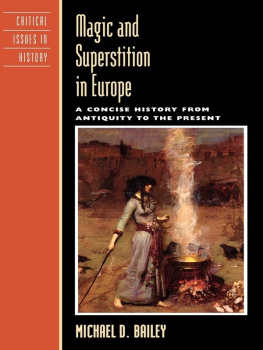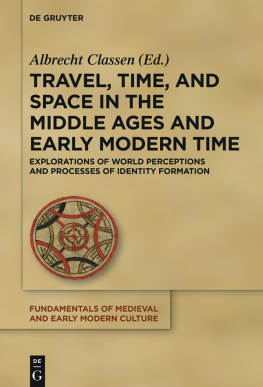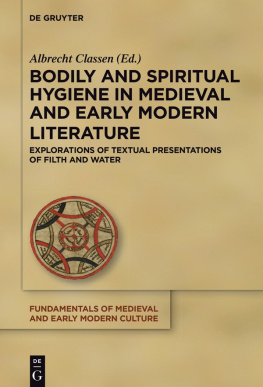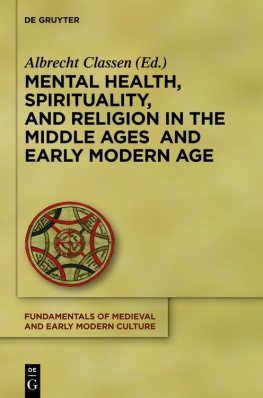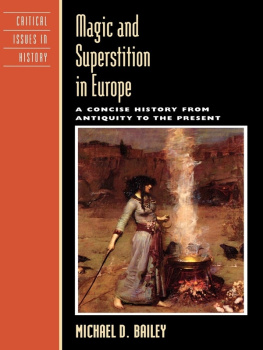Table of Contents
Guide

Magic and Magicians in the Middle Ages and the Early Modern Time
Fundamentals of Medieval and Early Modern Culture

Edited by
Albrecht Classen and Marilyn Sandidge
Volume 20
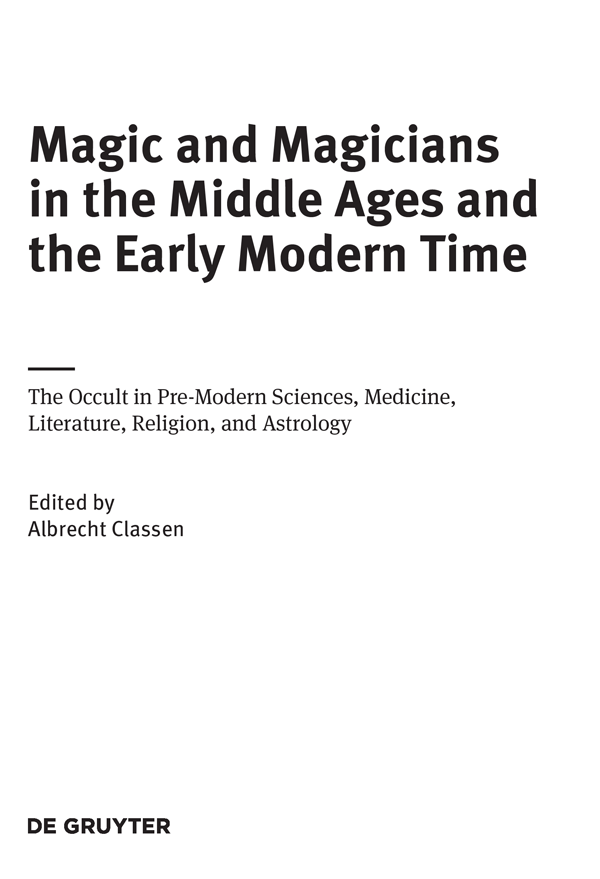
ISBN 978-3-11-055607-0
e-ISBN (PDF) 978-3-11-055772-5
e-ISBN (EPUB) 978-3-11-055652-0
ISSN 1864-3396
Library of Congress Cataloging-in-Publication Data
A CIP catalog record for this book has been applied for at the Library of Congress.
Bibliographic information published by the Deutsche Nationalbibliothek
The Deutsche Nationalbibliothek lists this publication in the Deutsche Nationalbibliografie; detailed bibliographic data are available on the Internet at http://dnb.dnb.de.
2017 Walter de Gruyter GmbH, Berlin/Boston
www.degruyter.com
List of Illustrations
Illustrations of Nurit Golans article
.
.
)
Illustrations of Kathleen Jarchows article:
Illustrations of Thomas Willards article:
.
.
Illustrations of Martha Peacocks article (all public domain):
Albrecht Classen
Magic in the Middle Ages and the Early Modern Age Literature, Science, Religion, Philosophy, Music, and Art. An Introduction
Albrecht Classen , The University of Arizona
Magic in German-Speaking Lands
In his elaborate ruminations on human nature and the role of folly, in his Praise of Folly , from 1509, first printed in 1511 and quickly copied, translated, imitated, and praised everywhere, the famous humanist Erasmus of Rotterdam also adds a curious list of national characteristics, referring to the French, the Italians, the Greeks, the Turks, the Jews, the Spaniards, and then to the Germans: Spaniards yield to no one in military glory. The Germans pride themselves on their tallness and their knowledge of magic.
To gain a taste of what this Introduction will explore and what this book is all about, we ought to consider at first how hard the Christian Church battled throughout the entire Middle Ages against all the various pagan cultures, and so was constantly confronted by the cult of magical practices as its self-chosen enemy.
What we cannot determine so easily is the true extent to which magic and all of its alternative manifestations were present or were operated by the secret or even publicly acknowledged practitioners. Moreover, what is the real difference between magic/superstition and religion? about prehistoric and primitive cultures and their religious or animistic beliefs, but this would go far beyond the scope of the present volume, though in essence the same questions as to the principles underlying magic and religion continued to be of relevance throughout the Middle Ages and until today.
In learned circles already long before the time of Humanism, there appear to have been many more practitioners of the magical, and prophesying art, as we can learn in the long diatribe by Death against the Plowman in Johannes von Tepls famous debate poem The Plowman (ca. 1401), written by a German poet living in Bohemia. While the Plowman had vehemently riled against Death for having taking his innocent and beloved wife, mother of their children, Death simply dismisses all those complaints and at the end, in chapter twenty-four, even ridicules human life and the human body as worth nothing at all, claiming absolute power over all existence. Death is rasping with satire, if not even sarcasm, being entirely assured of his supremacy.
However, the Plowman, by that time having calmed down in his emotions and having sharpened his rhetorical skills, responds with a glorious defense of the human body, describing it as Gods greatest creation, which many scholars have identified as the first major stirring of the Renaissance in German literature. apparent triumph in their argument and thus being afraid of losing his authority over human life:
Grammar, the foundation of all eloquent speech, will not help him with her precise and finely-turned locutions. Rhetoric, the blossoming ground of honeyed words, will not help him with her ornate and richly-coloured expressions. Logic, the insightful demarcator of truth and untruth will not help him with her sly concealment, with the crooked ways that mislead truth. Geometry, the ascertainer, assessor, and measurer of the Earth, will not help him with her unerring measurement, or with her accurate weighing. Arithmetic, skilled marshal of numbers, will not help him with counting and calculations, or with her dexterous digits. Astronomy, Master of the Heavenly Bodies, will not help him with her astral power, the influence of the planets. Music, the organising handmaid of song, will not help him with her sweet melodies, with her harmonious voices. Philosophy, field of wisdom, tilled and sown, and grown to perfection, in knowledge of Nature and God and in the production of ethical living; Physic, with her draughts that help many; Geomancy, skilful respondent to all kinds of questions posed on Earth; Hydromancy, unveiler of the future by dint of the workings of water; Astrology, interpreter of sublunar events through the course of the Heavens; Chiromancy, smart soothsayer from the hand and the lines of the palm; Necromancy, mighty compeller of spirits through the sacrifice of dead mens fingers and secret signs; the musical art, with her select prayers and her strong incantations; the augur, versed in the language of birds and so the true prophet of future events; the haruspex, indicating the future in the smoke of the altar-victim; Paedomancy, conjuror with childrens intestines, and ornithomancy, with grouses guts; the jurist, the Christian without conscience: will not help him by twisting right and wrong and passing crooked judgements. These arts, and all those related, avail nought: every man must be felled by Us, scoured in Our fulling-tub and cleaned in Our rolling-press. Take my word, you riotous ploughhand!
Death is right, of course, nothing and no one can go by him unscathed, but for his argument he would not need to dismiss all those arts in order to confirm his supreme position. Nevertheless, listing them all, combining the standard seven liberal arts with the wide range of necromantic arts, clearly indicates Deaths desperate attempt at that moment to maintain the upper hand and not to lose the debate. He does not really mean to reject all sciences, since he has no reason to malign necromancy and related divinatory arts specifically, but he wants to control the exchange with the Plowman and is suddenly afraid that the latter might have a better argument than Death.
Intriguingly, here we face a perfect example clearly illustrating the widespread knowledge and understanding of all kinds of magical arts, and probably also their acceptance under certain circumstance, both black magic and natural, or white magic during the Middle Ages and far beyond, as the contributions to the present volume will confirm from many different perspectives. Johanness Plowman debate poem is only a very late example of a long-term discourse on the meaning of magic since antiquity. So, let us take a look backwards and try to grasp the true dimension of magic as a learned art and instrument in the hands of both the educated and highly respected and more marginal figures of society.

